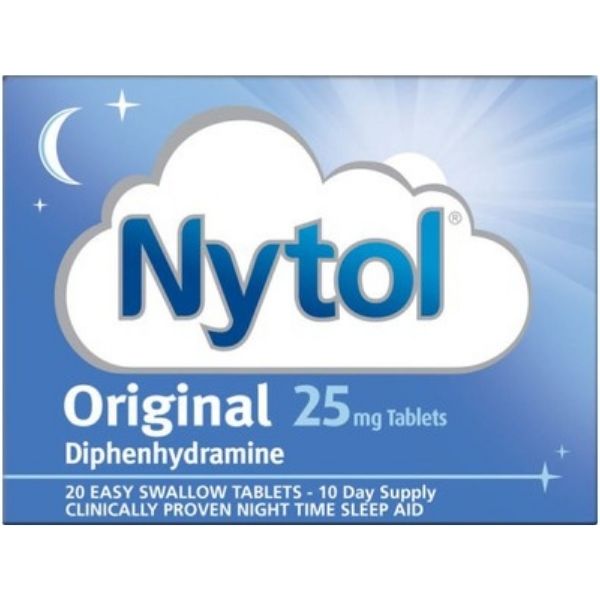
Nytol - Original 25mg 20 Tablets (P)
Nytol - Original Tablets 25mg
20 Tablets
Due to the nature of this medication the quantity is limited to ONE pack. If more than one is required please contact the pharmacy team and they will assess your requirements – https://www.weldricks.co.uk/customer-care (select Online medicine advice from the dropdown menu)
Nytol Original 25mg and its sister brand, Nytol One-A-Night, are both clinically proven night-time sleep aids. The two brands don’t differ in dosage, just the number of tablets you take. 2 for Nytol Original. 1 for Nytol One-A-Night. Simple.
They both provide temporary relief for sleeplessness by using a common antihistamine as a sedative to help you drift off into your regular sleep rhythm.
If you’re a bit tired of sleepless nights and looking for a temporary solution that helps you get to sleep, then Nytol Original 25mg could be right for you.
The commonly used antihistamine is diphenhydramine hydrochloride.
It blocks the normal actions of histamine, the chemical that stimulates arousal-promoting areas of the brain. This helps reduce alertness and promote that first drowsy stage of sleep. And once in that first stage of sleep, most people drift off naturally into restful deeper sleep
How to use
Oral administration only.
Two tablets to be taken 20 minutes before going to bed, or as directed by a physician.
Do not exceed the stated dose or frequency of dosing.
Do not use in children under 16 years
Warnings
Nytol is contraindicated in patients who are hypersensitive to diphenhydramine or any of the excipients and in those with the following conditions: stenosing peptic ulcer, pyloroduodenal obstruction.
Nytol should be used with caution in patients with myasthenia gravis, epilepsy or seizure disorders, narrow-angle glaucoma, prostatic hypertrophy, urinary retention, asthma, bronchitis and chronic obstructive pulmonary disease (COPD), moderate to severe hepatic impairment and moderate to severe renal impairment.
Tolerance may develop with continuous use. Seek medical advice if sleeplessness persists, as insomnia may be a symptom of serious underlying medical illness.
May increase the effects of alcohol, therefore alcohol should be avoided.
Avoid use of other antihistamine-containing preparations, including topical antihistamines and cough and cold medicines.
Use with caution in the elderly, who are more likely to experience adverse effects. Avoid use in elderly patients with confusion.
Patients with rare hereditary problems of galactose intolerance, the Lapp lactase deficiency or glucose-galactose malabsorption should not take this medicine.
Keep out of the reach and sight of children.
Diphenhydramine may potentiate the sedative effects of alcohol and other CNS depressants (e.g. tranquillizers, hypnotics and anxiolytics).
Monoamine oxidase inhibitors(MAOI) prolong and intensify the anticholinergic effects of diphenhydramine. The product should be used with caution with MAOIs or within 2 weeks of stopping an MAOI.
As diphenhydramine has some antimuscarinic activity, the effects of some anticholinergic drugs (e.g. atropine, tricyclic antidepressants) may be potentiated therefore medical advice should be sought before taking diphenhydramine with such medicines.
Diphenhydramine is an inhibitor of the cytochrome p450 isoenzyme CYP2D6. Therefore, there may be a potential for interaction with drugs which are primarily metabolised by CYP2D6, such as metoprolol and venlafaxine.
Diphenhydramine should not be used in patients receiving any of the above drugs unless directed by a doctor.
Pregnancy
Diphenhydramine crosses the placenta. Because animal reproduction studies are not always predictive of human response and since there is inadequate experience with use of diphenhydramine in pregnant women, the potential risk for humans is unknown. Use of sedating antihistamines during the third trimester may result in reactions in the newborn or premature neonates. This drug is not recommended during pregnancy. Consult a doctor before use.
Lactation
Diphenhydramine has been detected in breast milk, but the effect of this on breastfed infants is unknown. Nytol is not recommended for use during lactation. Consult a doctor before use.
Nytol is a hypnotic and will produce drowsiness or sedation soon after the dose has been taken. It may also cause dizziness, blurred vision, cognitive and psychomotor impairment. These can seriously affect the patient's ability to drive and use machines. If affected, do not drive or operate machinery.
Overdose is likely to result in effects similar to those listed under adverse reactions. Additional symptoms may include mydriasis, fever, flushing, agitation, tremor, dystonic reactions, hallucinations and ECG changes. Large overdose may cause rhabdomyolysis, convulsions, delirium, toxic psychosis, arrhythmias, coma and cardiovascular collapse.
Treatment should be supportive and directed towards specific symptoms. Convulsions and marked CNS stimulation should be treated with parenteral diazepam
Ingredients
The active substance: Each tablet contains Diphenhydramine Hydrochloride 25mg.
The other ingredients are: Anhydrous Lactose, Microcrystalline Cellulose, Maize Starch, Stearic Acid and Silicon Dioxide
